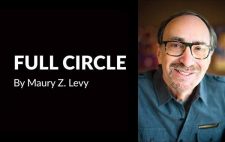I never heard so much silence. Nobody skipped down Levick Street today. Nobody sang songs of joy. Today, the girls in the little gray jumpers, the girls with the big red eyes, walked slowly, their heads bowed to the ground. There would be no running across Harbison Avenue today, no stopping at Greenman’s to buy penny candy. Today was a day like no other day.
Today, a day that the sun never came out, the girls from St. Tim’s had only one thought in mind. To get home, to be hugged, to try to understand what had just happened.
Three years ago, they had the world on a string. A young man, a handsome man, a Catholic man had been elected President. No one thought they would see the day. No one thought they would see the man. But this was a special man, a plain man but not an ordinary man. This was a man who knew kings and princes. And this was a man who fought for the poor.
This was a man who brought a country together. This was a man who promised the moon and the stars, and delivered on both.
And today, as fast as it had come, it was over. You could see it most in the eyes of the girls from St. Tim’s. Someone hadn’t just killed their President. Someone had killed their hopes and their dreams.
Today, those girls went straight home, home to the red brick rowhouses of Cardiff and Crafton and Calvert Streets, home to the 13-inch TVs where Walter Cronkite, alone in his shirtsleeves, took off his big, black glasses and cried.
It was a Thursday like no other day, a Thursday that didn’t end until Sunday.
We all had our stories, our stories of just where we were and just how we heard. I was in my first months of college, standing on Broad Street, gathered around a car that had an AM radio. No one spoke. We just listened.
As we drove home, through North Philly and Olney and Mayfair, there was still a hope, however false, that the bullets weren’t mortal, that the man we all loved would make it through. The man who had stood in Philadelphia, just a week before his election, and said, “I believe in an America where every child is educated not according to his means or his race, but according to his capacity; where there are no longer literacy tests for voting, because there are no illiterates; where children go to school for a full school day in a well-lit, well-heated, well-equipped classroom, taught by well-trained, well-paid teachers; where there are enough colleges and classrooms and dormitories to make it possible for every young man and woman of talent to go to college.”
And now, 1,042 days later, he was gone.
Soon, women walked out of the row houses and hugged each other in small comfort. Soon, men who never left work early came home. And soon the streets were empty. There would be no box ball today, no two-hand touch.
After, I couldn’t watch the television anymore, I grabbed my guitar and walked outside. It was a cheap guitar, a guitar with one string missing. First I strummed it and then I picked it. It took me awhile to realize I was playing “Taps.”
There are days that make you think and days that make you wonder and days that change the world. Suddenly, we were a different country. An old man replaced a new man as President. We had lost our spirit, we had lost our drive and, most of all, we had lost our innocence.
A few days later, men would return to work and women to the kitchens. The girls from St. Tim’s would walk back up Levick Street and say some special prayers and then, just like always, study their multiplication tables. And life would try to go on. But somehow, it wasn’t the same. Someone had killed our President. Someone had murdered our dreams.












